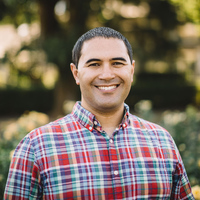
Mark Chenoweth
Related Authors
Paul Blowers
Emmanuel Christian Seminary
David W Congdon
University of Kansas
Dragoș Bahrim
St. Basil the Great's Orthodox Theological Seminary, Iași
Daniel Marrs
Baylor University
Gio Payne
University Of Roehampton
Bogdan G Bucur
St. Vladimir's Orthodox Theological Seminary
E. Brown Dewhurst
Ludwig-Maximilians-Universität München
Matthew Baker
Fordham University
Christopher P Whittington
Moody Bible Institute








Uploads
Videos by Mark Chenoweth
Papers by Mark Chenoweth
If St Maximus the Confessor read Jordan Daniel Woods’ essay on the differences between Hans Urs von Balthasar’s hopeful universalism and George MacDonald’s fully confident universalism, with which modern theologian would the saint find himself in agreement? I know some would say this hypothetical question is absurd because Maximus was convinced of the necessity of an eternal hell, and if you find yourself in this position, I would ask that you please thoughtfully consider the articles and books on Maximus by Andreas Andreopoulos, Ilaria Ramelli, and myself linked to in Fr Aidan’s “readings in universalism” page. For the rest of us who already see a definite universalist tendency in Maximus, if he was some type of universalist, surely the type of universalism to which he was closest should have some bearing on today’s conversation regarding the permissibility of the doctrine. Although I am taking what is probably a minority position, I’m going to maintain that Maximus would find Balthasar’s personal view rather exotic and innovative, and actually feel more at home with the fully confident universalism of MacDonald.
https://afkimel.wordpress.com/2020/06/30/was-st-maximus-merely-a-hopeful-universalist/
“There was no universalist saint after the fifth ecumenical council (553 CE) because it condemned universalism as heresy!” Although this exact sentence has never been uttered verbatim (as far as I am aware), many popular websites certainly seem to believe it. In contrast to that prevalent assumption, in what follows, I’m going to argue that there is at least one crucially important post-553 universalist or universalist-sympathetic saint: Maximus the Confessor.1 If Maximus was a universalist or at least considered universalism a permissible theological opinion, then he did not interpret the 553 Origenist anathemas as forbidding a belief in universal salvation. In this essay I will demonstrate:
- that the entire thrust of Maximus’ theology points almost unequivocally in a universalist direction;
-that in an often overlooked passage in Ambiguum 42, Maximus supports universalism, while at the same time clueing us in to the actual aim of those mysterious 553 Origenist anathemas;
-that the passages of “honorable silence” make the best sense when interpreted as referring to universal salvation—spiritual beginners should never be let in on the “universalist secret,” lest it make them spiritually lazy;
-that the terrifying passages in Maximus’ writings must be interpreted within the larger context of his theology.
While it is true that Hans Urs von Balthasar, Ilaria Ramelli, and Andreas Andreopoulos have trod similar ground before me, there are certain nuances of Maximus’ thought that have not yet been sufficiently explored relating to universal salvation.
https://afkimel.wordpress.com/2020/04/02/st-maximus-the-universalist/
Many of the critics of David Bentley Hart’s presentation of universalism in his That All Shall Be Saved argue that he doesn’t give nearly enough weight to church tradition. I agree. However, these critics, the latest one being the Eastern Orthodox priest Fr Lawrence Farley, tend to go on to say that not only does Hart not care about church tradition, but that the Orthodox Church Tradition speaks univocally against Hart’s universalist claims. The latter claim is where I demur. While Hart doesn’t much seem to care what church tradition has to say about universalism, it is nevertheless the case that there is a very strong stream of Orthodox Church Tradition (though certainly not the only stream) that supports him, not just in his universalism per se, but also in his arguments in support of it. I’m not just talking about St. Gregory of Nyssa and St. Isaac the Syrian, but several others as well. In this response to Fr Lawrence Farley’s review, my goal is to show the deep patristic foundations of Hart’s book and to respond to many of Farley’s criticisms using mostly the church fathers, although my own voice will chime in briefly from time to time.
Rather than following the trajectory of Farley’s review, I will begin by looking at what Farley sees as Hart’s pitiful use of scripture and tradition and then move on to look at Farley’s analysis of Hart’s arguments and rhetoric. The reader should also remember that Hart’s book was written to the Christian world at large, and his references to church tradition don’t typically refer specifically to Orthodox Church Tradition. Nevertheless, since this review is a response to Fr Lawrence who is concerned solely with Eastern Orthodox Church Tradition, when I say Church Tradition in this post, unless I qualify it, I mean the Orthodox Church Tradition.
https://afkimel.wordpress.com/2021/02/02/the-deep-patristic-roots-of-harts-universalism-a-response-to-fr-lawrence-farley/
Abstract: If libertarians advocate for a highly restricted use of violence in society, it is incumbent upon Christian libertarians to offer a hermeneutic approach to scripture that is at least compatible with this ethic. Origen of Alexandria's exegetical method, although very strange from a modern perspective, is a consistent biblical hermeneutic compatible with the libertarian restriction on violence. This article examines Origen's interpretation of violence in the book of Joshua. I begin by looking at his exegetical method as a whole, which he describes in his On First Principles and then move on to his allegorical interpretation of Joshua. Although I do not intend to offer a systematic defense of Origen's approach, simply introducing the Christian libertarian to Origen's take on the violence opens up the current Christian debate on the interpretation of the conquest narratives to a hermeneutic world that goes far beyond (without negating) the findings of historical criticism.
If St Maximus the Confessor read Jordan Daniel Woods’ essay on the differences between Hans Urs von Balthasar’s hopeful universalism and George MacDonald’s fully confident universalism, with which modern theologian would the saint find himself in agreement? I know some would say this hypothetical question is absurd because Maximus was convinced of the necessity of an eternal hell, and if you find yourself in this position, I would ask that you please thoughtfully consider the articles and books on Maximus by Andreas Andreopoulos, Ilaria Ramelli, and myself linked to in Fr Aidan’s “readings in universalism” page. For the rest of us who already see a definite universalist tendency in Maximus, if he was some type of universalist, surely the type of universalism to which he was closest should have some bearing on today’s conversation regarding the permissibility of the doctrine. Although I am taking what is probably a minority position, I’m going to maintain that Maximus would find Balthasar’s personal view rather exotic and innovative, and actually feel more at home with the fully confident universalism of MacDonald.
https://afkimel.wordpress.com/2020/06/30/was-st-maximus-merely-a-hopeful-universalist/
“There was no universalist saint after the fifth ecumenical council (553 CE) because it condemned universalism as heresy!” Although this exact sentence has never been uttered verbatim (as far as I am aware), many popular websites certainly seem to believe it. In contrast to that prevalent assumption, in what follows, I’m going to argue that there is at least one crucially important post-553 universalist or universalist-sympathetic saint: Maximus the Confessor.1 If Maximus was a universalist or at least considered universalism a permissible theological opinion, then he did not interpret the 553 Origenist anathemas as forbidding a belief in universal salvation. In this essay I will demonstrate:
- that the entire thrust of Maximus’ theology points almost unequivocally in a universalist direction;
-that in an often overlooked passage in Ambiguum 42, Maximus supports universalism, while at the same time clueing us in to the actual aim of those mysterious 553 Origenist anathemas;
-that the passages of “honorable silence” make the best sense when interpreted as referring to universal salvation—spiritual beginners should never be let in on the “universalist secret,” lest it make them spiritually lazy;
-that the terrifying passages in Maximus’ writings must be interpreted within the larger context of his theology.
While it is true that Hans Urs von Balthasar, Ilaria Ramelli, and Andreas Andreopoulos have trod similar ground before me, there are certain nuances of Maximus’ thought that have not yet been sufficiently explored relating to universal salvation.
https://afkimel.wordpress.com/2020/04/02/st-maximus-the-universalist/
Many of the critics of David Bentley Hart’s presentation of universalism in his That All Shall Be Saved argue that he doesn’t give nearly enough weight to church tradition. I agree. However, these critics, the latest one being the Eastern Orthodox priest Fr Lawrence Farley, tend to go on to say that not only does Hart not care about church tradition, but that the Orthodox Church Tradition speaks univocally against Hart’s universalist claims. The latter claim is where I demur. While Hart doesn’t much seem to care what church tradition has to say about universalism, it is nevertheless the case that there is a very strong stream of Orthodox Church Tradition (though certainly not the only stream) that supports him, not just in his universalism per se, but also in his arguments in support of it. I’m not just talking about St. Gregory of Nyssa and St. Isaac the Syrian, but several others as well. In this response to Fr Lawrence Farley’s review, my goal is to show the deep patristic foundations of Hart’s book and to respond to many of Farley’s criticisms using mostly the church fathers, although my own voice will chime in briefly from time to time.
Rather than following the trajectory of Farley’s review, I will begin by looking at what Farley sees as Hart’s pitiful use of scripture and tradition and then move on to look at Farley’s analysis of Hart’s arguments and rhetoric. The reader should also remember that Hart’s book was written to the Christian world at large, and his references to church tradition don’t typically refer specifically to Orthodox Church Tradition. Nevertheless, since this review is a response to Fr Lawrence who is concerned solely with Eastern Orthodox Church Tradition, when I say Church Tradition in this post, unless I qualify it, I mean the Orthodox Church Tradition.
https://afkimel.wordpress.com/2021/02/02/the-deep-patristic-roots-of-harts-universalism-a-response-to-fr-lawrence-farley/
Abstract: If libertarians advocate for a highly restricted use of violence in society, it is incumbent upon Christian libertarians to offer a hermeneutic approach to scripture that is at least compatible with this ethic. Origen of Alexandria's exegetical method, although very strange from a modern perspective, is a consistent biblical hermeneutic compatible with the libertarian restriction on violence. This article examines Origen's interpretation of violence in the book of Joshua. I begin by looking at his exegetical method as a whole, which he describes in his On First Principles and then move on to his allegorical interpretation of Joshua. Although I do not intend to offer a systematic defense of Origen's approach, simply introducing the Christian libertarian to Origen's take on the violence opens up the current Christian debate on the interpretation of the conquest narratives to a hermeneutic world that goes far beyond (without negating) the findings of historical criticism.